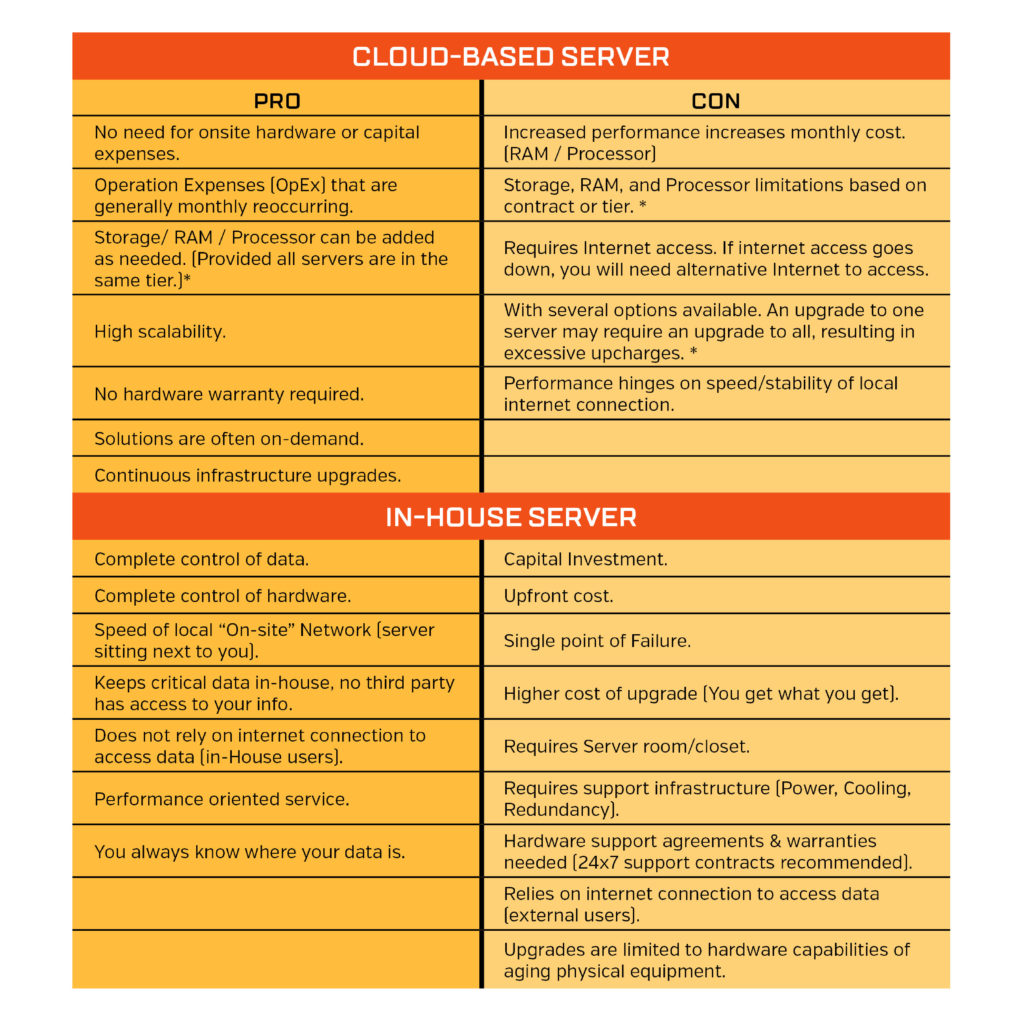Cloud-based servers and in-house servers are the two primary options for hosting data for businesses. Which option is best for you? The answer varies for each company and is dependent on several factors. We have put together this comparison chart to help you determine which type of server is best for your organization. Let’s start with definitions.
CLOUD-BASED SERVERS
We all have heard about “The Cloud.” However, most just know that it allows data to be saved… Somewhere. There is so much more to it and what it can do for your business.
A Cloud Server is a centralized server resource that is pooled, hosted, and delivered over a network. A network could be things like Google Drive, Dropbox, one drive, etc. This allows data to be accessed on-demand by multiple users at once.
Cloud technology allows an infinite number of servers to act as a single entity. Cloud Servers can be located anywhere and deliver services remotely. A Cloud Server securely stores your business information and allows you to access your business data anytime, from anywhere, and from any device. Cloud computing and management solutions are fast and user-friendly.
Because these networks are hosted outside of your system, server instances and/or resources are constantly maintained and live within someone else’s datacenter or environment. They take on the cost of hardware refreshes and server resources to keep the network running.

IN-HOUSE SERVERS
In-House Servers differ by the physical space they occupy within your office building or suite. Because of this centralized location, resources are accessible by those on the same Local Area Network (LAN) or by those who have access using a VPN (Virtual Private Network) that would give access to this internal resource.
An In-House Server does not traditionally make use of virtual technology, and is a good option for a company that does not want to rely solely on the internet. Keeping your data on an in-house server means that all your critical and sensitive information is at your fingertips and away from third parties.
Maintaining an In-House Server is very different from that of its Cloud counterpart. Since this server lives within a physical space, it requires both hardware and server refreshes. These are the responsibility of the business that operates with it.
THE PROS AND CONS

WHAT TYPE OF SERVER IS BEST FOR YOUR BUSINESS?
Choosing between an In-house or Cloud-based Server solution is different for each company and dependent on operations, goals, and capabilities. For example, if your workforce is remote, even part of the time, you will want easy access to data anywhere there is an internet connection. Therefore, utilizing a cloud server is the option that makes the most sense.
However, if your organization wants to keep critical data in-house to prevent third party access and wants to have full control over your backup, an inhouse server may be your best option.
Additional factors may also need to be considered. How many offices do you have? What is the size of your business? Does your area frequently experience storms, power failures, or other risks to your data? Is your team tech-savvy? Although there is no direct answer, considerations such as these will help in determining which option is best for your business.
NEED IT HELP?
FUSE3 is there for you. We will help you navigate the ever-changing landscape of information technology. We manage any business technology that you use daily and work to keep your business running smoothly so you can focus on what you do best. Reduce costs and improve productivity with FUSE3.
